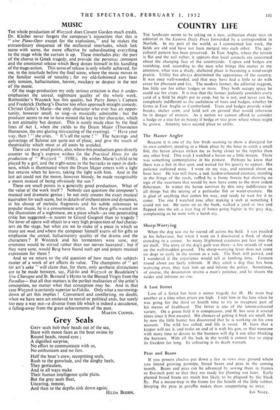MUSIC
THE whole production of Wozzeck does Covent Garden much credit. Dr. Kleiber never forgets the composer's injunction that this is " eine Piano-Oper except for the explosions," and he makes the extraordinary eloquence a the orchestral interludes, which link scene with scene, the more effective by subordinating everything to the stage while the curtain is up. These interludes play the part of the chorus in Greek tragedy, and provide the personal comment and the emotional release which Berg denies himself in his handling of the stage-action. This sense of release is only wholly achieved, for me, in the interlude before the final scene, where the music moves in the familiar world of tonality ; for my old-fashioned ears hear only tension, hallucination, horror, mockery or despair in the rest of the music.
Of the stage-production my only serious criticism is that it under- emphasises the unreal, nightmare quality of the whole work. Rothmtiller's Wozzeck has this quality, but Parry Jones's Captain and Frederick Dalberg's Doctor too often approach straight comedy. Christel Goltz's Marie—the only character who ever has an oppor- tunity, however small, to sing—is musically admirable ; but the producer seems to me to have missed the key to her character, which is not animality but despair. This is surely made clear by the final lines of Act 1, when she yields to the Drum Major (Thorsteinn Hanneson, the one glaring mis-casting of the evening). " Have your way, then ! "she cries. " It's all the same ! " The heavings and quiverings of Salome are quite out of place, and give the touch of theatricality which must at all costs be avoided.
There are two small points, also, where this production goes directly counter to Berg's express wishes (in the Practical Hints for the production of " Wozzeck " [1930]). He wishes Marie's child to be played by a girl, and the night-scene in the barracks to open in dark- ness, which is illuminated when the Drum Major enters with a light but returns when he leaves, taking the light with him. And in the last act could not the moon, however bloody, be made recognisably a moon instead of being obviously the sun ?
These are small points in a generally good production. What of the value of the work itself ? Nobody can question the composer's musical and dramatic genius ; he not only creates the exact musical equivalent for each scene, but in details of orchestration and dynamics, in his choice of melodic fragments and his subtle references to popular music, he is a consummate artist. Are these gifts wasted on the illustration of a nightmare, on a piece which—as one penetrating critic has suggested—is nearer to Grand Guignol than to tragedy ? No lover of opera will object to a very high proportion of bad charac- ters on the stage, but what are we to make of a piece in which so many are mad, and where the composer himself exerts all his gifts to emphasise the unreal, hallucinatory quality of the drama and the characters ? If Wozzeck and his tormentors were sane, our emotions would be stirred rather than our nerves lacerated ; but if they were sane, would Berg have found such apt and potent musical expression for them ?
And so we return to the old question of how much the subject- matter of a work of art affects its value. The champions of" art for art's sake " will claim that, for them, only aesthetic distinctions are to be made between, say, Fidelio and Wozzeck or Baudelaire's Line Charogne and St. Bernard's Hymn to the Blessed Virgin from the Paradiso-- that all that matters is the perfect realisation of the artist's conception, no matter what that conception may be. And in that case Wozzeck is certainly superior to Fidelio. Only what a narrowing- down of art this implies ! Convenient and comforting, no doubt, when we have seen art enslaved to moral or political ends, but surely too easy a way out—a divorce from life which is indeed a decadence, a falling-away from the great achievements of the past.
MARTIN COOPER.


































 Previous page
Previous page